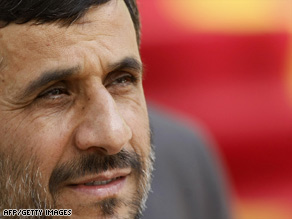TEHRAN, Iran -- Iranian President Mahmoud Ahmadinejad on Sunday dismissed violent protests against his election victory by comparing voters' anger to a "football match."

Mahmoud Ahmadinejad hailed the election as an "example" for the entire world of the people's will.
"Some people are sentimental and become excited," he added. "As I said, I compared it to a soccer match. Their team has not won in the match."
"In the end, I don't think we'll have any serious challenges," he said. "Sentiments are high and sometimes they do some stuff on the streets, but in the end we had 40 million people participating and what is happening on the streets is like a football match."
In a news conference, Ahmadinejad portrayed his apparent win in Friday's election as a victory over foreign powers.
"The era of a few countries making decisions for the rest of the world has come to an end," he said. "Those who want to hamper the progress of the Iranian nation, the Iranian people will resist." Watch Ahmadinejad say that Iran in 'the most stable country in the world' »
Ahmadinejad, the hardline incumbent, defeated reformist rival Mir Hossein Moussavi, a former prime minister, in Friday's election, according to official results. Opposition supporters claimed ballot fraud.
Riot police fired tear gas and brandished batons to disperse about 100 stone-throwing protesters in central Tehran.
"There was this cat-and-mouse game between the rioters and the police," said Samson Desta, a CNN producer, who was hit by a police baton. "For the time being, it seems like police have things under control. But we spoke to a lot of students and they're saying, 'This is not going to go away. They may stop us now but we will come back and make sure our voices will be heard.' "
It was the second day of protests in Tehran. On Saturday, thousands of demonstrators -- shouting "Death to the dictatorship" and "We want freedom" -- burned police motorcycles, tossed rocks through store windows, and set trash cans on fire. ![]() Watch as Ahmadinejad is declared the winner »
Watch as Ahmadinejad is declared the winner »
There were conflicting reports on whether his rival, Moussavi, had been placed under house arrest.
Some reports indicated that he had been detained. Others said he was at home, conducting meetings, but was free to come and go as long as he informed authorities. Guards were stationed outside his house, but it was not immediately clear whether they worked for him or the government.
In other parts of Tehran, the streets were eerily calm with some residents worried that violence may escalate when Ahmadinejad supporters come out for the victory celebration.
"We are all worried about that," said Yashar Khazdouzian, a student. "People against people is the worst kind of riots in Iran." Eighty-five percent of the country's 46 million eligible voters went to the polls Friday -- an unprecedented turnout, Iran's Interior Ministry said.
When the ballots were counted, the government declared Ahmadinejad the winner -- with 62.63 percent of the vote. Moussavi, the man many analysts had expected to win, received 33.75 percent.
Moussavi disputed the results, blaming "untrustworthy monitors." Independent election observers were banned from polling places.
"The results announced for the 10th presidential elections are astonishing," he said in a statement. "People who stood in long lines and knew well who they voted for were utterly surprised by the magicians working at the television and radio broadcasting."
Angered by the returns, Moussavi's supporters took to the streets Saturday. With handkerchiefs and surgical masks shielding them from the pungency of tear gas, they clashed openly with police in a rare challenge to the regime. ![]() Watch angry protesters take to streets »
Watch angry protesters take to streets »
Foreign reporters were blocked from covering the demonstration. And the government reportedly shut down access to networking sites, such as Twitter, making it difficult for information to seep out to the outside world.
Iranian authorities closed Al-Arabiya's Tehran bureau for a week without offering a reason, the Arabic network announced on its Web site Sunday in Arabic and English. Two female reporters were attacked outside Moussavi's headquarters on Friday, according to Reporters Without Borders.
Immediate reaction around the world was guarded, with the United States and Canada voicing concern over claims of vote irregularities.
"In light of Tehran's ongoing policy, and even more so after Ahmadinejad's re-election, the international community must continue to act uncompromisingly to prevent the nuclearization of Iran, and to halt its activity in support of terror organizations and undermining stability in the Middle East," said Israeli Deputy Prime Minister Avigdor Lieberman.
Ahmadinejad hailed the vote, saying it was a "great ordeal" but one that pointed "the way to the future."
"The people of Iran inspired hope for all nations and created a source of pride in the nation and disappointed all the ill wishers," Ahmadinejad said in his television address. "This election was held at a juncture of history."
Many analysts had expected Moussavi, a former prime minister regarded as a reformist, to defeat Ahmadinejad.
Moussavi is credited with successfully navigating the Iranian economy during a bloody eight-year war with Iraq in the 1980s. He also enjoyed tremendous support among the nation's youth. Iran's population has a median age of 27.
But Ahmadinejad -- despite being blamed for Iran's economic turmoil over the past four years -- maintains staunch support in rural areas.
No matter who won, the ultimate power in Iran still resides with Supreme Leader Ayatollah Ali Khamenei. Khamenei lauded the results and urged Iranians to support the re-elected president.
The system was set up after Iran became an Islamic republic in 1979 when the ruling monarchy was overthrown and Shah Mohammad Reza Pahlavi was forced into exile.
0 comments
Post a Comment
Share your coment